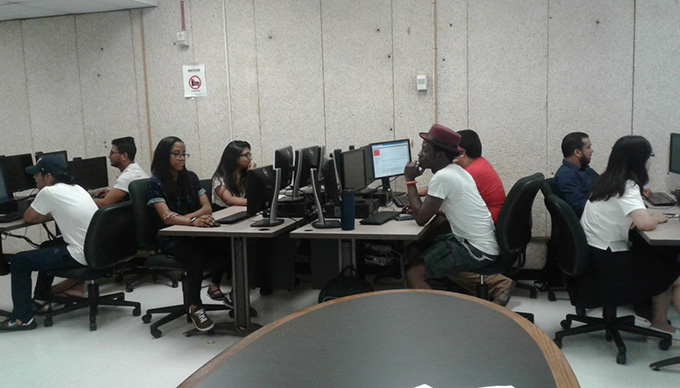
Fortunately for me, I teach on a campus where diversity is the norm. New York City College of Technology (one of the campuses of the City University of New York) is 33% Hispanic, 30% Black (non-Hispanic), 20% Asian and 11% White (non-Hispanic). The reversal of Obama-era Affirmative Action guidelines, clearly, is not going to affect me or my school much at all. My students will continue to surprise me and to challenge me and each other through their differences next year as much as they are doing now. By the time they graduate, each of them will know how to negotiate groups that include people from disparate countries and cultures and who come out of any number of language backgrounds.
City Tech students are lucky. No matter what the United States may do to isolate itself from the rest of the world, they are part of that broader world as much as they are part of New York and the United States. They know that world for, in many ways, they are that world. And, fortunately for the rest of us, they are not unique, even in the United States. There are campuses like City Tech all over the country.
At the same time, given this new policy, I feel badly for those who will be attending many other American colleges over the next few years. They are not going to pick up, almost accidentally, a smattering of Spanish or learn something about the numerous dialects and peoples in China. Unlike one of my students from the Dominican Republic, they are not going to be able to direct people to good Indian restaurants (she is constantly mistaken for a South Asian), for they will not have been around, as my student has been, Indians, Pakistanis and Bangladeshis for years. They are going to have harder times learning new languages and mastering foreign (to them) dialects. In many other ways, too, their educations are going to be restrictive, not expansive.
I spent a couple of years teaching for a very nice public university in Pennsylvania. The vast majority of students there came from backgrounds like my own, Americans descended from the British Isles, Germany and Scandinavia. Perhaps one in ten of the students was African-American. They had a difficult time at the school, for they really were a minority in a majority campus culture. The university did what it could to provide support for them. It recognized that their value extended far beyond their own educations, adding something to that the the majority students who had had, frankly, little exposure to people other than those, like me, of experiences similar to theirs.
Though I liked it there, I was relieved to be able to return to New York to teach here at City Tech.
A prediction: Even though many students at “elite” colleges come from backgrounds that better prepared them to enter college, my students are not only going to compete with them but, because of their broader backgrounds and wider exposure in college, they will soon start to best them–if American colleges stop working to have diverse student populations. If they take this new policy as a license for ignoring Affirmative Action.
What the Trump administration is asking colleges and universities to do is worsen the education they give by narrowing to class and ethnic background the types of students attending any one campus. If a top school cannot make room for students who do not fit its normal profile, it will end up not providing support services needed by those few who manage to get there–and that will further reduce their numbers. Colleges will each become all white, all Asian, all Hispanic, all Jewish all African-American. Perhaps they will better be able to provide support for students in their one category (the reason colleges with specific missions to specific groups were founded), but they will not be exposing them to difference. And “difference” is a necessary part, certainly, of successful American education for the future.
Not only are people from different ethic and racial backgrounds (and, therefore, different educational backgrounds) going to be disappearing from some of our colleges, but schools are going to start catering to families who can afford to add special prep to their regular schooling. Yes, this is already true, but Affirmative Action works to balance this out. Now, it won’t.
After fifty years of trying to diversify the American experience for everyone, the nation seems to be retreating into little fortresses of ‘like.’ We see it on Facebook and in our politics. Now, we are going to start to see it, more than ever before, in our colleges and universities.
That’s too bad. I would hate to say that the grand American experiment is over, but it is certainly being hard-pressed.
Fortunately, there are places around like City Tech, and plenty of them, where diversity is already so overwhelming that it makes up a natural part of the American lives forming through the school. Many of these schools, City Tech among them, have been getting stronger each year, especially since the start of this century. That won’t change, for admission here (as at many similar schools), while not quite as open as CUNY once was, still invites almost everyone to join in to build their education. There are ambitious Americans of every ethnicity, religion, race and class. When they come together, the retreat from the future that this new Trump policy foretells is impossible.
Let’s all keep this in mind as we struggle against the forces that want to retreat to an imagined past instead of move forward to a world-based future.
